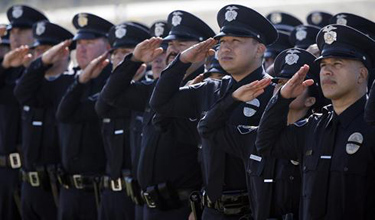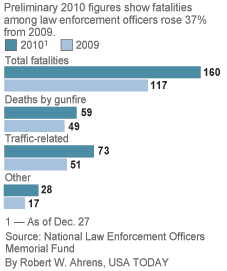
Officers salute as they watch the funeral of police Officer Ryan Bonaminio broadcast on a giant screen to an overflow crowd of mourners in Riverside, Calif., on Nov. 16. Bonaminio was shot and killed on Nov. 7 after he pulled over the driver of a stolen big-rig cab. (Stan Lim, The Press Enterprise, via AP)
The number of law officers killed in the line of duty across the United States jumped 37% this year, reversing two consecutive years of steep declines, according to a report released Monday by a national police advocacy group.
The deaths of 160 officers in 2010 includes a 20% increase in fatal shootings that involved five cases in which at least two officers were killed by gunfire in single incidents in Arkansas, California, Florida and Puerto Rico, a survey by the National Law Enforcement Officers Memorial Fund found.
Fatal shootings jumped from 49 in 2009, to 59 in 2010, marking the second straight year in which gunfire deaths increased by at least 20%. Meanwhile, traffic-related deaths - the leading cause of work-related death for police - increased from 51 in 2009, to 73 this year, according to the report.
The increases in all major categories marked a striking turnaround from 2009 when the 117 officer fatalities represented a 50-year low, according to the police group.
Craig Floyd, chairman of the memorial fund which closely tracks officer deaths, suggests the rise in fatalities represents "troubling signs" that officer layoffs and other public safety budget cutbacks due to the lagging economy are "putting officers at risk."

"The budget cutbacks mean less training and fewer available resources, like replacing cars when you need to," Floyd says. "Hopefully, these numbers will be a warning signal."
Jim Pasco, executive director of the Fraternal Order of Police, the nation's largest police union, says there is no clear evidence that a reduction in force or resources is behind the spike in fatalities.
"I really think that at the end of the day, this is a reflection of the cyclical nature of this kind of violence," he says.
In the past five years, the officer fatality numbers have varied up and down, reaching a recent high of 185 in 2007.
One of the most recent casualties was recorded Sunday when a Massachusetts officer was shot to death during an alleged armed robbery at a department store.
"A more brazen, cold-blooded criminal element is on the prowl in America," Floyd says. "And they don't think twice about killing a cop."











